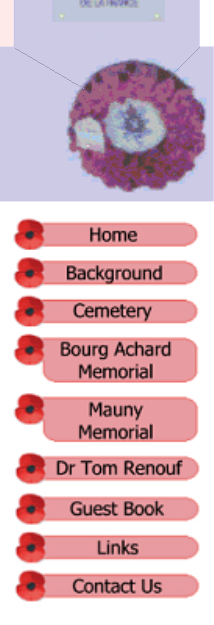

English |

Français |
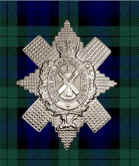
"Nemo me
impune lacessit"
("No one provokes me
with impunity")
|
|
|
|
|
Mauny Memorial
|
Towards the end of
2012 we received news that a new memorial was going to be
erected in the village of Mauny to commemorate the 6 Black Watch
soldiers who were killed during it's liberation, Major Donald
Mirrielees, Sergeant Thomas Kirkcaldy, Lance Corporal Harry
Billington, Corporal James O'Keefe, Corporal Harry Chapman and
Private George Hildred. The memorial was to be the
result of 2 years planning by a local WW2 reenactment society member, Laurent Lecomte
who is fascinated with Scotland's 51st Highland Division. A request was made to Dr Tom
Renouf to unveil the memorial, Tom was more than happy to attend
and set about trying to trace other family members, with the
exception of ourselves this proved to be too great a task to
complete in time for the unveiling. We were also more than happy to attend and made
arrangements to be in Mauny for the unveiling on 1st June 2013.
The new memorial was to be sited alongside the existing 1st
World War memorial on which could be seen the scars of the
battle for Mauny village in 1944.
|
|
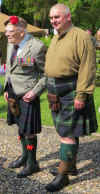
Tom & Laurent
|
|
|
When I learned that there were 6
Black Watch
men killed here I thought that it was incomprehensible
that
their memory was lost, memory needs to stay so that the
history doesn't repeat itself. - Laurent Lecomte
There is a real culture of commemoration amongst the
French,
they want to remember those that gave their
lives their liberty
and they don't want new generations
to forget. - The British Military Attaché
The men had died for our
freedom and our peace.
- Mauny Mayor Charly Noel
As time goes on we think of
the fallen but we don't think
about the individuals of the
fallen, but today we did it so that
the individuals were
remembered and I think the people of
Mauny have good reason to
be proud of themselves.
- Dr Tom Renouf
He
wrote to his Mother after landing in France
and said "The
weather was good and so was he", 3 days
later he was killed
in the battle for Mauny. - Jacqui Scales
I
think it's fantastic, I don't think that
anybody should forget
the young lives that were given - Jacqui
Scales
|
|
|
|
|
|
|
After 12 long weeks of ferocious fighting in the Normandy bridgehead, the 51st Highland Division was to be rested after taking Lisieux, its final objective. 5th Black Watch was ordered to make its last attack on Mauny, stated to be a skirmish by comparison. ‘A’ company would lead the attack on the Chateau which was reported to be the strong point. When ‘A’ company came under fire and held up, ‘B’ company, led by Major
Mirrielees, continued the attack from the flank and reached the Chateau. The combined strength of ‘A’ and ‘B’ companies soon forced the enemy to surrender. Intense shelling and mortaring around the Chateau however caused a lot of casualties.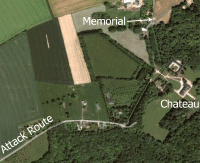
During the battle for the Chateau ‘C’ and ‘D’ companies were ordered to attack Mauny village. There was some enemy resistance but this was small by comparison. It is known that Corporal Chapman, Major
Mirrielees and George Hildred and possibly Sgt. Kirkcaldy were killed at the Chateau and that Corporal O’Keefe and L/Corporal Billington were probably killed in Mauny village.
Dr Tom Renouf |
|
|

Reporter David Cowan
and cameraman Colin McLean covered the unveiling for
STV, their report can be found here.
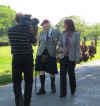
Jacqui & Tom
walk the attack route
filmed by Colin
|
|
|
|
Mauny Report
Dr Tom Renouf
On landing at Beauvais airport my wife and I were greeted by a weather change. The sun shone brightly as we drove off looking for the road to Rouen in a hired Citroen C4. Our choice of route could have been better. Rouen is notorious to negotiate even with a
sat nav.
Travelling along the open road with the country side fresh and green and the smell of Normandy bringing back memories, I realised that the allure of going back was just as strong as in younger days.
After booking in and enjoying a fine Hotel meal we assembled with the friends who had come to Mauny for the ceremony. In our company were Ian and Jacqui Scales, niece of George Hildred, Nigel and Margaret McArthur and Tom and Angela Boyd, both families with Black Watch and Highland Division connections. Together with Dave Cowan of STV we agreed a programme to satisfy all interests.
On Saturday 1st June a lone piper in shirt sleeve order gave us a warm welcome to the first event on the official programme – a reception and garden lunch at the family home of Laurent Lecomte.
The scene on the sun drenched lawn was set by Laurent and his Highland Division re-enactment group, all dressed immaculately in Regimental attire, intent on adding a period background to the proceedings. To our delight Valerie Parkinson, friend and guardian of our Highland Division monument at Breville was introduced as our interpreter for the day. Present in the gathering were all those who had helped to organise the day’s proceedings.
After lunch a cavalcade of cars headed by four WWII jeeps drove back to the village to be welcomed on the steps of the Marie by the
Mairie Charly Noel. The principals were introduced to one another over a glass of wine before moving to their positions.
The memorial to our Black Watch comrades was sited beside the impressive War Memorial which stood at the entrance to the village street. A marble plaque carrying the names of our Fallen Comrades was slope mounted on top of a four foot high block of local granite.
At 1.30pm the ceremonies opened with a grand military parade that impressed the villagers as it marched up the main street to the
Mairie and his guests of honour positioned in front of the Monument. It was headed by the Normandy Highland Pipe Band followed by the Highland Division Re-enactment group led by a few stalwarts immaculately dressed in blues mess dress, bearing a Union Jack standard and the others in battle dress with rifles at the slope bearing a Highland Division standard. Bringing up the rear was a dozen Ancien Combattants, each one carrying a standard. As it passed the Mairie the invited dignitaries – the British Military Attaché, the French Army representative and the Regional Commissaire – joined the procession.
The procession, some forty strong, took up their positions, forming a semi-circle on the high ground behind the Monument and the dignitaries joined the
Mairie’s party. Due to the sloping nature of the ground the assembly was framed in an impressive portraiture that gave everyone a perfect view of what was going on.
After a welcome given by the Mairie to his guests Dr. Tom Renouf addressed the large crowd that had gathered. He told the villagers what happened on the day Mauny was liberated and in referring to the battle for the Chateau he described how the intense shelling had caused many casualties and indicated where most of his comrades had been killed. He added that when the Chateau was captured 25 prisoners were taken and most of the villagers were found sheltering in the basement. Among them was a mademoiselle, now a Madam Pavloff, who is here with us today.
Jacqui Scales talked about the short life of her uncle George and told of the grief suffered by his many brothers and sisters at his death and how his grave had been visited regularly by her father. A number of wreaths were then laid, including three representing the bereaved families.
In his speech, the Military Attaché told that ceremonies of this nature were important because they strengthen the bond between our countries. Then finally the
Mairie recalled how the villagers had suffered during the dark day of the Occupation when Liberation was all that they prayed for. The joy that Liberation brought was tinged with sadness when it was known that their Freedom had cost the lives of six Liberators. “Sixty nine years later” he stressed “we still remember the debt we owe these young men and today we pay tribute to their memory by erecting a memorial in their honour.” The
Mairie then invited Tom Renouf to unveil the memorial.
All the speeches were translated into or from French by Valerie Parkinson who by her sensitivity and clarity made the spectators feel part of the ceremony.
The Lines to the Fallen and the French equivalent were said by the French liaison officer. This was followed by God Save the Queen played by a twelve piece band from the St. Ouen de Thouberville School. Without hesitation the Flower of Scotland was played by the pipers and then the Marseillaise had everyone singing to the school band. The bugler sounded the Last Post, silence was observed and the Reveille signalled the end of the ceremony, but no, in order to acknowledge the Highland connection with the village the ceremony was concluded with the pipe band playing the Flower of Scotland, beautifully sung by Laurent’s sister.
The villagers of Mauny had good reason to be proud of the ceremony. In addition to honouring our Fallen Comrades, the ceremony had been presented beautifully in the best possible Scottish tradition.
A vin d’honneur was held in the Marie during which presentations were made and gifts exchanged. As the sole representative of the Liberators, I was made a Citoyen d'Honneur of Mauny and introduced to Madame Pavloff, the only survivor from the basement of the Chateau on Liberation Day. It seemed that the whole 180 population of the village and many more had turned out to support the event. The school band played war time favourites, cameras clicked everywhere, the pipe band gave a recital and the celebrations continued for the rest of the afternoon.
With time pressing and Dave Cowan anxious to film the battle site, our group accompanied by the
Mairie and a few others, moved to the starting point where ‘A’ company, led by Corporal Chapman’s section, was fired on. In 1944 we approached Chateau Mauny from the south-west first to negotiate a minefield and then a roadblock of felled trees. Another quarter of a mile further on we prepared to climb over a second roadblock when a machine gun opened fire from the woods ten yards ahead. Everyone dived for cover as the bullets sprayed around us. I did not realise I had been wounded until I felt hot blood running down my back. My army buddy Alex Corris, risking his own life, crawled over to me to help me on my way back to the RAP. It was here that Corporal Chapman was fatally wounded. I remembered every detail and recognised the exact spot without the slightest doubt.
Dave’s camera man filmed as I described what happened, using our HD re-enactment group to reconstruct the action.
With ‘A’ company pinned down unable to advance ‘B’ company was ordered to make a flanking attack on the left. They advanced into the woods surrounding the Chateau where bitter fighting took place as the enemy withdrew into the Chateau prepared to make a last stand.
As ‘A’ and ‘B’ companies manned the Chateau boundary wall preparing to storm the Chateau, intense shelling and mortaring rained down on the area causing many injuries. It was at this time that Major
Mirrielees and George Hildred were killed.
The filming continued as I walked with Jacqui to the gates of the Chateau to tell her the one thing she wanted and yet dreaded to know – the spot where George died. She did not speak and I could only imagine the feelings of sadness and finality tugging at her emotions.
During the battle for the Chateau ‘C’ and ‘D’ companies were ordered to attack the village of Mauny. There was some enemy resistance but small by comparison. It is assumed that Corporal O’Keefe and L/Corporal Billington were killed in Mauny village.
The day ended with a reunion back in Laurent’s family home where it was agreed by all that the result of the planning and efforts had exceeded all expectations. As we talked in the glow of the setting sun I had to admit that there was one feature that gave me cause for concern and then I told them the story about Ginger.
After my wound was dressed and the ambulance was full of casualties, we set off for the hospital in distant Bayeux when I heard groans coming from one of the two stretcher cases I went to see if I could help. To my horror I found the casualty to be Corporal Chapman suffering from a fatal bullet wound to the head. When I looked at the other stretcher case I was shocked to find that it was my friend Ginger, our platoon runner, seriously wounded by bomb blast shrapnel. I was greatly saddened because both of them were survivors of El Alamein, the Desert and the Sicily campaigns. Both had been very kind to me and I felt a sense of guilt that their lives were being sacrificed and I was being spared.
When we stopped at the second dressing station the doctor examining my two comrades pronounced that they were about to die. As I stood by the stretchers paying my last respects I heard a song coming from a nearby wireless which brought tears to the saddest moment of my war for it was playing “J’attendrais” which I knew was their favourite song.
My concern was that Ginger did not correspond to any of my six Fallen Comrades. He was a Yorkshire man and had an old-timers’ army number. To complicate the matter Sgt. Kirkcaldy was also called Ginger and knowing Army Records to be near perfect I could not explain why Ginger’s name was not listed o n the Rolls of Honour. The problem had troubled me for years. It was Jacqui who suggested that on Sunday when we visited the CWGC at Lisieux where our six Comrades are buried we should look for any other Black Watch soldier killed on 28th/29th August 1944.
Next morning our first visit was to the little known memorial at Bourg Achard erected at the crossroads just outside the town by the townsfolk shortly after the war and discovered by George Hildred’s brothers. This modest structure carried a plaque with only the four names of Mirrielees, O’Keefe, Billington and Hildred carved on it. It was erected to commemorate the temporary graves of our Comrades buried in the adjoining field before their bodies were exhumed and re-interred at the CWGC at Lisieux. It was well kept implanted with flowers and possibly visited by the Maire on Remembrance Day.
At St Desir cemetery Dave Cowan filmed the six gravestones as we placed small wooden crosses on each one. When we came to the grave of Major
Mirrielees, Jacqui pointed out that a root of poppies had been planted there in recent times. It is probable that this was done by some relative which surprised me greatly because my researches indicated that the family line had ended. If not, then efforts should be made to let the family know about the Mauny ceremony and the memorial. Dave then made a hasty exit back to Beauvais for his plane.
After most of the others had left I spent some time in the tranquillity of the cemetery searching around the sun drenched graves to find that so many of our Highland Division comrades had been killed during the breakout in the seven day drive to the Seine. As I was thinking of the lives that had been denied my contemporaries, Jacqui gave me a call. When I joined her she had found the grave of a soldier who was killed on 28th August 1944, but to our astonishment there was no name, no army number and no Regiment on the gravestone. It was the grave of an unknown soldier. We did not know what to think. It seemed to be more than a coincidence and we could not resist speculating that this was the grave of my long lost friend, Ginger. Verification was required, then with this I could be certain that it was seven and not six comrades that were killed at Mauny and I would know that one of them was the Ginger I saw die as his favourite song was being played. No longer would he be an unknown soldier, his name could be added to his gravestone, the Rolls of Honour and possibly to his local war memorial. Also the discovery could well be a huge consolation to his family if they were to know about it.
We reasoned that the War Graves Commission would not have an unknown soldier on their (named) Rolls of Honour and might not be able to help us. Also we now know from the Roll of Honour of St.
Desir that no other Black Watch soldier was killed on the 28th/29th August. We assumed that Army Records would possibly know every Black Watch soldier killed in the War, including those buried in an unknown grave and that this would give us the name we were seeking..
We left St. Desir to go our separate ways. I would spend two days at St. Valery where I found our Highland Division flag bearers Raphael Distante and Maggie Savoye planning for the 75th Anniversary of the 1940 Battle and delighted to know that the surviving POW veterans, God willing, were determined to attend in 2015.
On 4th June most of those who attended the Mauny ceremony were reunited to enjoy a wonderful evening of friendship as bar-b-cue guests at the home of Valerie and Kevin Parkinson. Included in the merry company were our HD re-enactment group from Mauny who were camping on Valerie’s estate.
On the 5th and 6th we attended several of the ceremonies organised by the Paratroop veterans of 6th Airborne Division. Although the Highland Division fought side by side with the Paras during the ferocious battles of the bridgehead, it was disappointing that no mention was made at these ceremonies of the outstanding part played by the 51st in the battle. It is to be hoped that there will be a strong effort to have HD representation next year at the 70th Anniversary of D-Day.
|
Update: 29th June
2014
(More on
the 2014 visit here &
here)
In June 2014 we
were once again invited to a ceremony at the Mauny Memorial, we
all met up at the Hotel in Bourg Achard on the evening of 31st
May, this year we were joined by Rose and her husband Ben, Rose is
the Niece of Major Donald Mirrielees and her first visit to the
area.
|
|
The 1st June was
an early start to Laurent's parents. Having met others from
last year, we were put in cars, headed across the Seine on a
car ferry to Chateau
Taillis which has a 1944 museum of amazing artifacts -
one clever photo developer at the time, took a second copy
of a German soldiers personal photo's and kept them, they
are unique and not seen by the outside world for many years.
|

|
|
Afterwards we
headed back to Laurent's parents and lunch, we then set off for
the ceremony at Mauny. It was more emotional than last time but
no-one could explain why!! Afterwards we joined the Deputy Mayor
and villagers for a small reception whilst the pipers played.
There was a young band leader looking resplendent in full highland
dress, probably aged 7-8 and he took his role very seriously,
which was lovely to see. |
 |
 |
 |
|
|
|
We then departed
in cars to the spot where Tom was shot, and he brought out his
whisky flask and 4 cups, one for him, one for Rose, one for
Laurent and one for Jacqui. We drank to his fallen comrades and
then headed off to Chateau Mauny where Laurent's Dad (aged 12 in
1944) said he knew where the hole in the wall was, this is where
George went through following Major Mirrielees - sadly falling on
the other side. |
 |
 |
 |
|
We were allowed
inside the gates so we could see the copse from a different angle
to last year. The small wooded area is now very overgrown and
inaccessible but we tried to imagine the view in 1944 when the
trees were small and the brambles were non-existent.
Laurent's Father
said that he'd covered German mines with material from his shirt
so that the British soldiers wouldn't walk on them – as a 12
year old he’d walked with the Germans as the mines were laid,
only to go back later and mark them.
|
|

Newspaper article from Thibaudeau Philippe
| Mauny.
A memorial is
erected to the memory of six British soldiers buried
in 1944 in the municipality of occupation.
In Honour of
liberators
|
On
this Sunday June 1st 2014 in Mauny, 185
inhabitants has honoured its liberators, six
soldiers of the Black Watch, 51st Highland
Division who died on August 28th 1944 to
liberate the village and its Chateau where
German troops were holding people hostage in the
basements. Among the soldiers of the British
infantry sacrificed was young George Hildred,
who was killed in the grounds of the Chateau at
the age of 18 years.
These
heroes came from Scotland
|
|

From right to left:
Tom Renouf, Laurent Lecomte, Deputy Mayor Michel
Cheron
and three families of fallen soldiers.
|
|
Seventy
years after, a veteran of the Scottish regiment,
Tom Renouf, was back on the scene, accompanied
by several family members of the fallen
soldiers. After
visiting the museum "August 44" at the
Chateau of Taillis in Duclair, visitors are
pictured near the memorial in Mauny. "The
village chose to erect this memorial so that
they are never forgotten and the sacrifice of
these soldiers who came to liberate the
area" says Deputy Michel Cheron. The
ceremony was organised by Laurent Lecomte, |
|
|
who
was fascinated by the story of the liberation of
the village. His
Father, at the age of 12 years, had
welcomed them with a wave. Laurent
Lecomte was lucky enough one day to meet
Tom Renouf, who then told him the Chateau
story. "I was wounded at Mauny and
six of my comrades were killed" he
says, before detailing the unfolding of
this very ferocious battle.
|
|
|
"Since
that time I was looking for a way to find
these names to honour" says Laurent
Lecomte. "I had before me one of the
soldiers in this battle. Today my mission
is filled. On the monument are engraved
forever the names of these heroes who came
from Scotland and died to liberate us. May
they never be forgotten".
|
|
Update:
8th June 2015
(More on
the 2015 visit here &
here)
In June 2015 we
revisited the memorial, this time with Christine (George's youngest Sister) and
Mavis (George's Sister in Law).
We
were joined by Laurent, his parents and Nigel &
Mags, we had a short service followed by a minutes
silence.
Afterwards
we stopped off at the Chateau to show Christine the
area where George had fallen, Christine
commented that she hoped George had not suffered and
died instantly.
|
|
Update: 12th May
2018
A small remembrance service was
kindly arranged by Laurent and overseen by the Mayor of Mauny.
Update: 1st June 2019
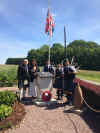
|
 |
The
Rouen
Pipe-band played
at a remembrance service on the morning of 1st June,
many thanks to the Mayor of Mauny, Laurent, Rouen Pipe Band,
Nigel, Mags and several loyal attendees.
Update: 21st August
2022
| Hello
my friends,
Here are some pictures of the ceremony in tribute to
George and his comrades who gave their lives so that
we can live in freedom.
We will never forget them.
Laurent
|
|
|
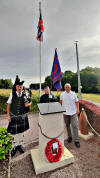 |
 |
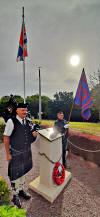 |
|
|
Update: 28th August
2024
During a visit in August
2024 we held a small remembrance ceremony, a Black Watch
wreath was laid by Gus Brydon (Son of the late George
Brydon) and Jacqui, a poppy cross was laid by our 12
year old Grandson Aiden. Many thanks to Laurent Lecomte
for arranging the ceremony and to the president of the
community, the mayor and the piper for their attendance.
|
 |
 |
|
|
|

